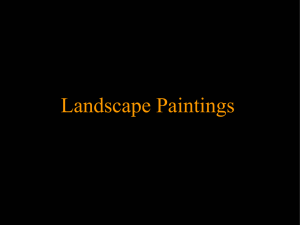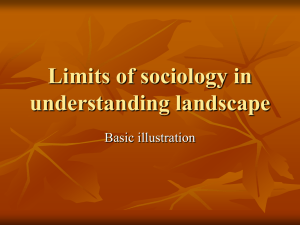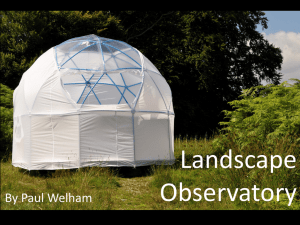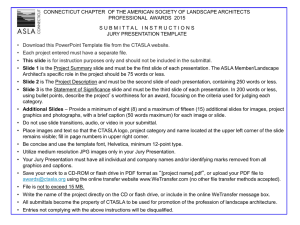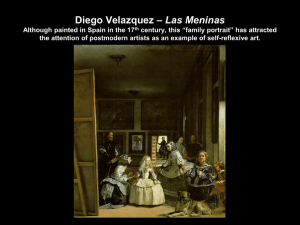European and Czech traditions of landscape
advertisement
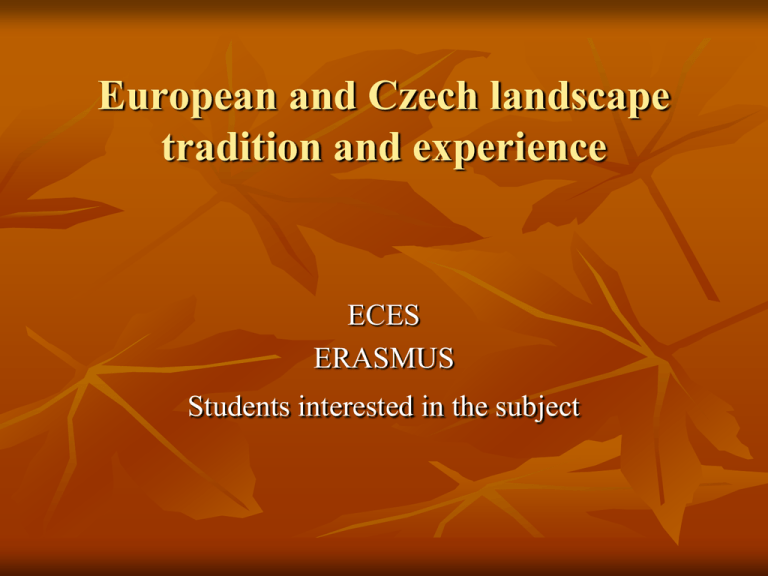
European and Czech landscape tradition and experience ECES ERASMUS Students interested in the subject Krajina - landscape “Krajina” in Czech community is not a neutral term Homeland Tradition Heritage of ancestors, fathers… Beauty Fertility…source of life Safeness Nature Culture Work of rural generation People History Religion War ….. Krajina in Czech context…. National revival … 1) 1771 - 1813 2) 1813 - 1830 3) 1830 - 1848 ….substitution of political freedom …national identity…strong social and cultural cohesive function of landscape Pilgrimages, processions, mass meetings, holy places The evidence of (cultural, social, mental, psychological, narrative, scientific, etc.) landscape perception is landscape paintings Cranach Lucas older, *1472 – †16.10.1553, German, the leading representative of German reformation, near friend of Martin Luther – romantic landscape painting of Danube school. VENUS Cranach L. Junior, Na vinici Páně Vineyard of the Lord (the main story between clergy and secular) L. Cranach older, The Rest on the Escape to the Egypt (holy family supported by angels, Herodias king – killed every new born boys, to eliminate prophesy, but…birch tree, spruce) L. Cranach, Portrait L. Cranach St. Margarita Claude Lorraine Landscape with Cephalus, Procris, and Diana, 1635/6 Claude Lorraine Landscape with Apollo and Mercury (1645). Claude Lorraine 1600 – 1682, Campagna Peter Breughel older Netherlandish Proverbs Peter Breughel older tower-of-babel Peter Breughel older - The harvesters 1565 (emancipation of landscape, l. no more in background) Caspar David Friedrich Tetchenský oltář 1806 Tetchen Altar (Against academic tradition) Landscape in paintings (until 16th – even 18th ) Scenery Environment Background Infill – filling Edging Landscape under the Theory of Sublime Object of the sublime Experience of divinity Experience of eternality Harmony of Nature Awe and fear WORD HISTORY • It would seem that in the word landscape we have an example of nature imitating art, at least insofar as sense development is concerned. • Landscape, first recorded in 1598, was borrowed as a painters' term from Dutch during the 16th century, when Dutch artists were on the verge of becoming masters of the landscape genre. The Dutch word landschap had earlier meant simply “region, tract of land” but had acquired the artistic sense, which it brought over into English, of “a picture depicting scenery on land.” Interestingly, 34 years pass after the first recorded use of landscape in English before the word is used of a view or vista of natural scenery. • This delay suggests that people were first introduced to landscapes in paintings and then saw landscapes in real life. History (landschap, land, „land, soil…země, půda“ and schap, ; in English landskip, land and skip – ship, „ loď“ also schaft, shape „composition, form, face…složení, tvar, forma, podoba“); contemporary English landscape Land-Scape - (tangible form/intangible perception) Terra …..Latin …..just area Landscape (in European/American meaning) Refers to the layout in terms of a land area and to its visual representation, particularly as portrayed by members of the painting community. 1. A portion of land or territory which the eye can comprehend in a single view. 2. A picture representing a scene by land or sea, actual or fancied, the chief subject being the general aspect of nature, as fields, hills, forests, water etc. 3. In general - demarcated area (in medicine) Land---Scape construction Scenery……land/scape Ownership, government….land/shaft, krajina Some methodological problems have their roots in the landscape construction - Landscape in your native language? Terms: Pre- scientific no logical relationships between each other, but contains experiences, people can understand and imagine what is behind the term – sharing experiences. empirical, based on sharing experiences expression of the world. Terms.. Scientific no sharing experiences, but logical analytical relationships to each other. Analytical, formalized description of the world. Landscape belong to....term? Founded scientific definition Alexander von Humboldt…the last man who looks on the nature as a one unit, holistic entity Landscape is “Totalcharakter” the total-nature of the Earth's surface (1806) Landscape as a unique nature culture continuum emerged Totalcharakter“ of A. von Humboldt… Landschaft ..“Das Total Character einer Erdgegend“ „the total-nature of the Earth's surface“ (1806) The total character of a piece of the earth. The system at the earth surface of biotic and abiotic forces that visually can be recognize Landscape as a tangible ecosystem Scientific definitions of landscape in Landscape Ecology N-C-Continuum The total character of a region Alexander von Humboldt cca 1806 A heterogeneous land area composed of a cluster of interacting ecosystems that is repeat in similar form throughout Forman, Godron, 1986 Landscapes dealt with in their totality as physical, ecological and geographical entities, integrating all natural and human (cause) patterns and processes Z. Naveh 1987 A particular configuration of topography, vegetation cover, land-use, and settlement pattern which delimits some coherence of natural and cultural processes and activities Green, 1996 A highly complex system …where abiotic, biotic and anthropogenic components and their interrelations form the structure and functioning of a generic entity Lesser 1997 European Landscape Convention Florence, 20.X.2000 Article 1 – Definitions For the purposes of the Convention: a "Landscape" means an area, as perceived by people, whose character is the result of the action and interaction of natural and/or human fators; Landscape / Inscape External landscape – internal landscape “Landscape painting is about the changes in the human inscape from prehistoric to modern times”. Internal landscape, mental map – inscape: Pierre Dansereau, 1975. Inscape and Landscape. Columbia University Press, New York, London, 118p. Inscape may also change, independently of the physical context, under the influence of socio-cultural factors. These changes may have their impacts on the external landscape – land/use, planning, landscape design…leading to further action… Landscape – macrospace – landscape scale R.T.T.Forman Land Mosaics, Cambridge Univ. Press, 1977 Our terms Landscape……in theoretical, philosophical Landscapes …..in real, ecological Inscape……….in sociological, psychological, also knowledge system point of view ?? Next student oral presentation: • Is there any landscape painting in prehistoric period? • Beyond the landscape painting – landscape photographs. Land as the art (Land – art)

